 Petzlover
Petzlover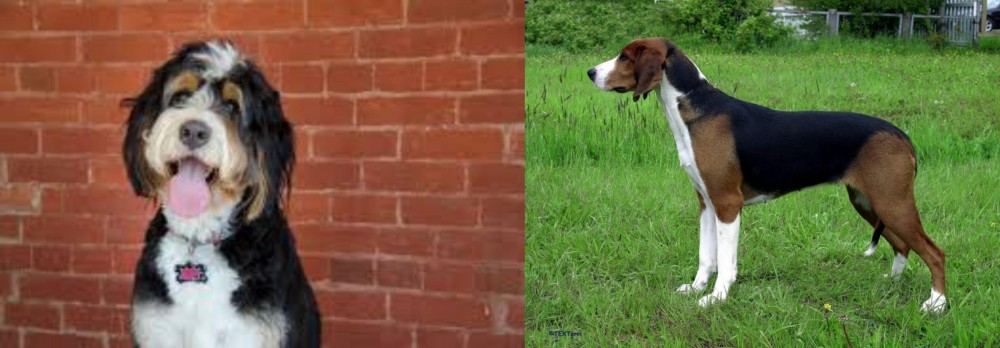 Bernedoodle is originated from Canada but Finnish Hound is originated from Finland. Bernedoodle may grow 19 cm / 7 inches shorter than Finnish Hound. Bernedoodle may weigh 16 kg / 36 pounds more than Finnish Hound. Bernedoodle may live 3 years more than Finnish Hound. Both Bernedoodle and Finnish Hound has almost same litter size. Bernedoodle requires Moderate Maintenance. But Finnish Hound requires Low Maintenance
Bernedoodle is originated from Canada but Finnish Hound is originated from Finland. Bernedoodle may grow 19 cm / 7 inches shorter than Finnish Hound. Bernedoodle may weigh 16 kg / 36 pounds more than Finnish Hound. Bernedoodle may live 3 years more than Finnish Hound. Both Bernedoodle and Finnish Hound has almost same litter size. Bernedoodle requires Moderate Maintenance. But Finnish Hound requires Low Maintenance
 The Bernedoodle is a hybrid cross between the Bernese Mountain Dog and the Standard Poodle. They have been around for many, many years but the first official” cross between the two breeds came from Sherry Rupke out of SwissRidge Kennels. The first Bernedoodle were achieved in 2003. She now has an entire breeding program for this hybrid.
The Bernedoodle is a hybrid cross between the Bernese Mountain Dog and the Standard Poodle. They have been around for many, many years but the first official” cross between the two breeds came from Sherry Rupke out of SwissRidge Kennels. The first Bernedoodle were achieved in 2003. She now has an entire breeding program for this hybrid.
A bernedoodle or a first generation is a cross between a purebred a purebred Poodle and a purebred Bernese Mountain Dog. This is a 50/50 mix. This mix is a very low shedding dog and though no dog is hypoallergenic, the Bernedoodle is as close as it gets. If the cross is true between two purebred dogs, the new breed will have the calm, sweet demeanor of the Bernese Mountain Dog and the intelligent, goofy, playfulness of the Poodle. At the same time the Bernedoodle is a hybrid so there will not be two exactly alike.
With purebred dogs you get a lot of consistency from one dog to another. Not so with the Bernedoodle. Each one will be a little different. Sometimes a hybrid dog can be healthier than their parents. Other times there can be health issues with hybrid. It is all about the breeder and if they breed for the right health traits.
If the breeder is conscientious enough the pup will have the best characteristics of both original breeds. Therefore, the Bernedoodle is happy, smart, playful, friendly and social. Sometimes the breeding doesn’t go as planned and you can end up with a Bernedoodle with the stubbornness of the Bernese or the hyper activity of the poodle. As a new cross breed, the Bernedoodle is not recognized by the American Kennel Club because it is a hybrid. They are recognized by the International Designer Canine Registry, The American Canine Hybrid Club, The Designer Dogs Kennel Club.
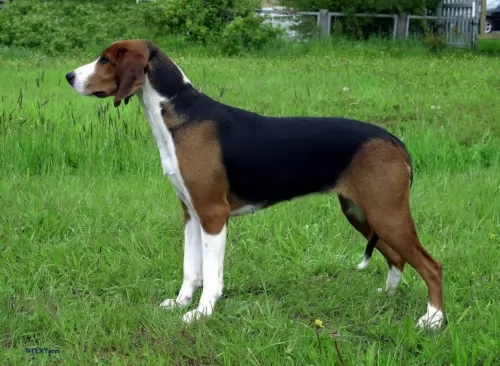 As one of Finland’s most popular dogs, the Finnish Hound isn’t particularly well known outside of Finnish borders. Known also as the Finsk Stovare, the Finnish Hound, known for its hunting skills, came about because of a breeding effort which started way back in the 1800s, mixing dogs such as different French, Swedish, and German hounds.
As one of Finland’s most popular dogs, the Finnish Hound isn’t particularly well known outside of Finnish borders. Known also as the Finsk Stovare, the Finnish Hound, known for its hunting skills, came about because of a breeding effort which started way back in the 1800s, mixing dogs such as different French, Swedish, and German hounds.
These hounds were used with the idea being to develop a dog that could do well in Finland’s terrain. The Finnish Hound is a great hunting dog but isn’t looked upon as an particularly awesome pet, although some pet owners would beg to differ.
 Since the Bernedoodle is a hybrid and not an AKC recognized breed, there is no set-in stone breed standard. There are three sizes of Bernedoodles and at least three generations. All of these should be strong boned dogs with powerful and compact bodies. They have log ears, button eyes and a triangle shaped muzzle. The tail is long and bushy, and the coat is medium to long.
Since the Bernedoodle is a hybrid and not an AKC recognized breed, there is no set-in stone breed standard. There are three sizes of Bernedoodles and at least three generations. All of these should be strong boned dogs with powerful and compact bodies. They have log ears, button eyes and a triangle shaped muzzle. The tail is long and bushy, and the coat is medium to long.
There is no standard color, but the most common color is black and white or tri like the Bernese Mountain Dog. They can also be black and brown, sable or merle. The coat is wavy or curly like the poodle.
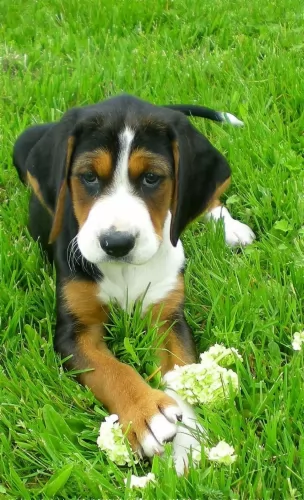 This is a medium sized dog who stands between 52 – 62cm in height and weighs in at 20 to 25kg. The Finnish Hound can have between 4 – 8 puppies.As a scent-hound, the Finnish Hound has a short, smooth double coat which is usually in a tri-color pattern of black, tan, and white.
This is a medium sized dog who stands between 52 – 62cm in height and weighs in at 20 to 25kg. The Finnish Hound can have between 4 – 8 puppies.As a scent-hound, the Finnish Hound has a short, smooth double coat which is usually in a tri-color pattern of black, tan, and white.
The attractive dog has an athletic, lean, muscular body full of energy and stamina. The eyes are brown and the dog has a peaceful expression. The medium length ears are floppy and the tail is long and carried low.
The Finnish Hound is friendly, calm and never aggressive. He is an intelligent dog nd will respond to the training and socialization he will require to turn him into an obedient, amicable pet, especially since he tends to be stubbon, independent and strong-willed. He isn’t recommended for small places in the city but will do better in the country with a fairy large piece of ground. The Finnish Hound is not recommended for apartment life. It is moderately active indoors and does best with at least an average-sized yard.
 This is a very social dog that needs to be with people. If you don’t have a lot of time for a dog, then this is not the one for you. He is gentle, calm and affectionate. He is intelligent and sometimes stubborn. They need to be socialized early in life and they will be great with kids and other small animals. They tend to be very playful. Toys and minis have more energy, more stubbornness and more of the poodle divaness.
This is a very social dog that needs to be with people. If you don’t have a lot of time for a dog, then this is not the one for you. He is gentle, calm and affectionate. He is intelligent and sometimes stubborn. They need to be socialized early in life and they will be great with kids and other small animals. They tend to be very playful. Toys and minis have more energy, more stubbornness and more of the poodle divaness.
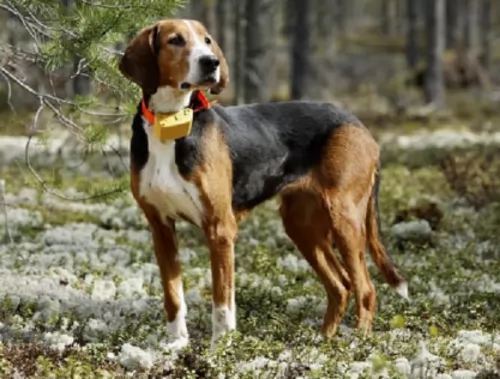 The Finnish Hound has always been a working dog and so he will require being well exercised.
The Finnish Hound has always been a working dog and so he will require being well exercised.
He makes a good pet with homes where there are other dogs as well as children. As a hunting or working dog, these days the Finnish Hound is also regarded as a companion animal, fitting into family life well, and turning out to be a loving, loyal pet.
 Because the breed is so new and bred pure so far, there is not a lot of information about their health or their life span. Even as they seem to have less issues than their parents – the Bernese cancer issue for example does not seem to plague the Bernedoodle. However, that does not mean they don’t have issues. They are still prone to some serious issues.
Because the breed is so new and bred pure so far, there is not a lot of information about their health or their life span. Even as they seem to have less issues than their parents – the Bernese cancer issue for example does not seem to plague the Bernedoodle. However, that does not mean they don’t have issues. They are still prone to some serious issues.
Skin issues, hip and elbow dysplasia, and eye issues are prevalent in this new breed. They have a tendency toward hot spots and sometimes allergies. Asks a reputable breeder if they have tested the parents and the puppies for dysplasia and eye issues.
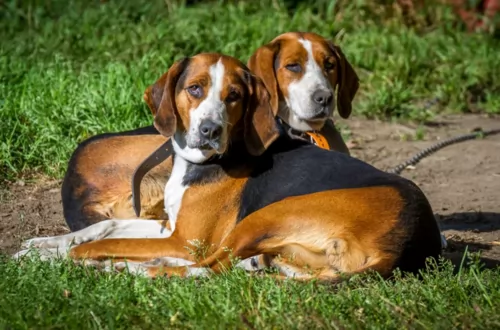 The Finnish Hound is looked upon as a generally healthy breed who can get to 12 years of age if looked after well. Good nutrition plays a huge role towards excellent health.
The Finnish Hound is looked upon as a generally healthy breed who can get to 12 years of age if looked after well. Good nutrition plays a huge role towards excellent health.
Check out common health ailments that can affect most dogs such as dental disease, obesity, hip dysplasia and a serious condition for which these dogs are particularly known – cerebellar ataxia. Lesions in the brain affect the dog’s coordination and sight. Get him to the vet as soon as you detect anything unusual with your pet.
 Since the Bernedoodle comes in three different sizes, there will be three different feeding regimens. No matter the size of your dog, feed them quality food twice a day. The standard is a big dog and should be fed as such but the toy and mini will eat a lot less. You can pretty much feed a standard Bernedoodle the same thing you feed a Bernese Mountain Dog. The Bernedoodle is a picky eater and you may have to change up their food at times to keep them interested.
Since the Bernedoodle comes in three different sizes, there will be three different feeding regimens. No matter the size of your dog, feed them quality food twice a day. The standard is a big dog and should be fed as such but the toy and mini will eat a lot less. You can pretty much feed a standard Bernedoodle the same thing you feed a Bernese Mountain Dog. The Bernedoodle is a picky eater and you may have to change up their food at times to keep them interested.
Again, these are healthy dogs because the cross breed is so young. There are not a lot of genetic issues. As mentioned previously hip dysplasia, eye issues, elbow dysplasia and skin issues are possible.
This is a calm, not over active dog. They do not share the high energy level of the poodle but rather carry the calm, gentle energy of the Bernese. The toy and mini varieties tend to have a faster motor than the standard. They need daily walks no matter what their size is. They will need your attention regularly.
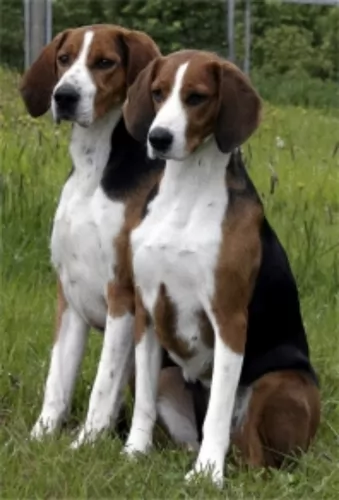 As a medium-sized dog breed, you want to make sure to feed your dog a high-quality commercial dog food – one that has been formulated with the right amount of vitamins and minerals for the type of dog he is.
As a medium-sized dog breed, you want to make sure to feed your dog a high-quality commercial dog food – one that has been formulated with the right amount of vitamins and minerals for the type of dog he is.
He is a high-energy hunting breed, so you wan to find a food that is appropriate to his needs. Home cooked brown rice, vegetables and chicken can be added into his kibble as a change and a treat from time to time as well as some raw meat occasionally. Make sure he always has access to fresh, cool water.
Physically active and mentally balanced and intelligent, the Finnish Hound will require both physical and mental stimulation to prevent him from becoming bored and frustrated.
As an average shedder, your pet's smooth, short-haired coat is easy to keep in tip top condition. All that is really required is to brush the coat down twice a week to keep it in peak condition.
Don’t neglect to check the inside of the dogs ears, as too much dirt and wax can cause nasty ear infections. Also, the teeth need to be brushed at least 2 or 3 times a week with special canine toothpaste and toothbrush. This will ward off tooth decay and lots of other problems within the body brought about by bad teeth.